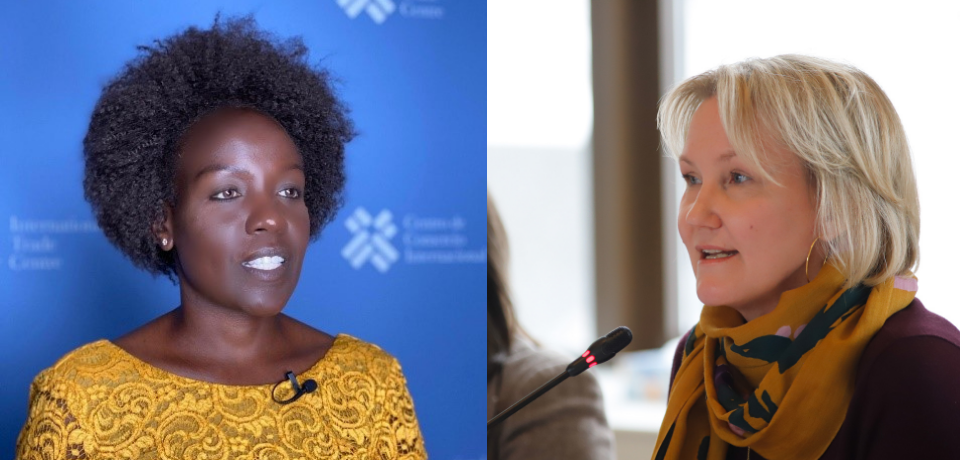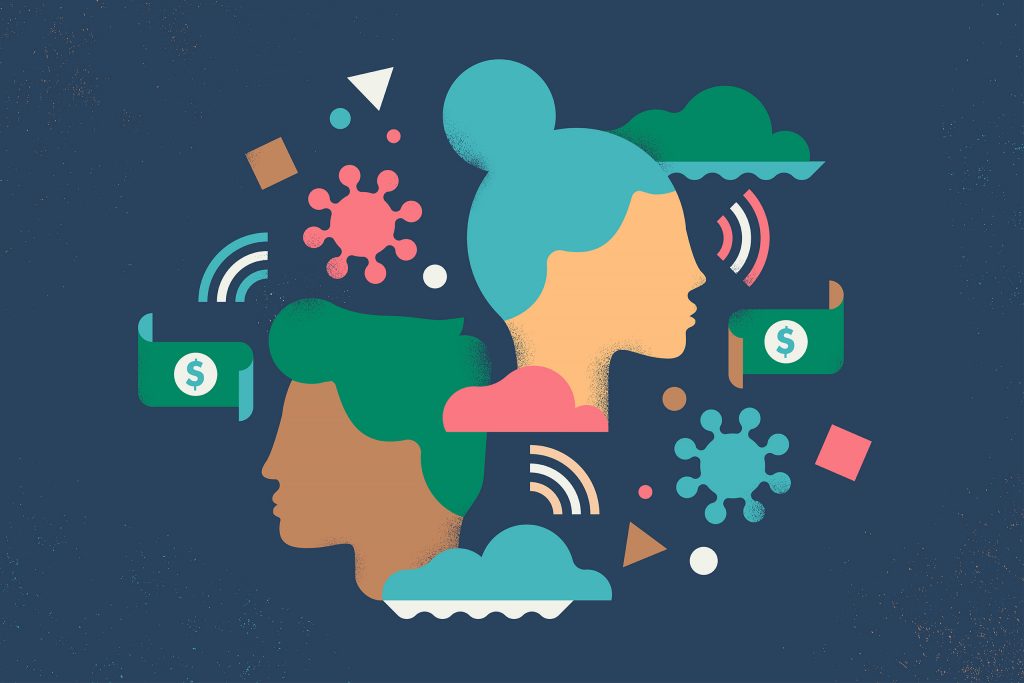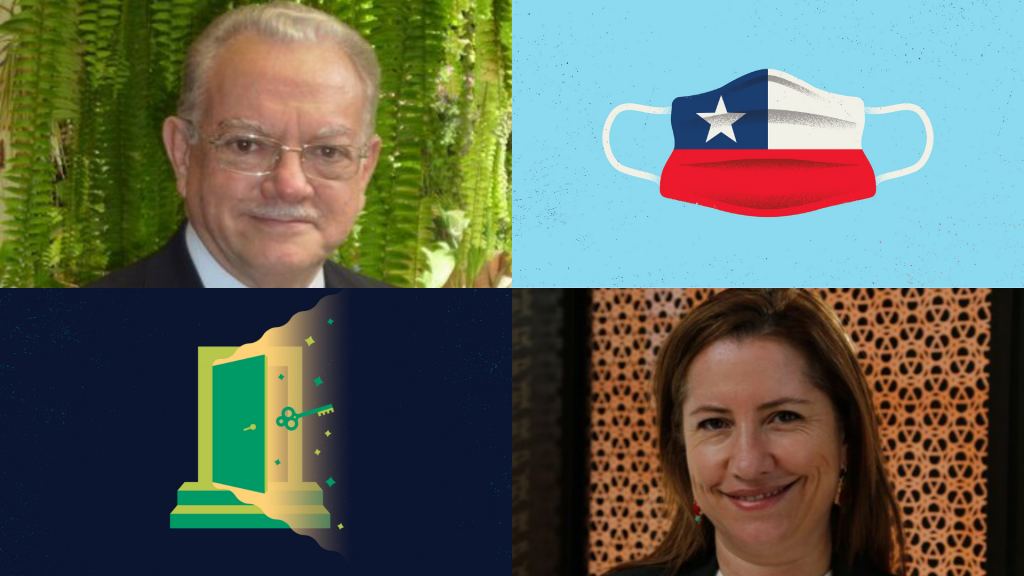Author: Astrid Haas
BiographyAstrid Haas
Astrid R.N. Haas is an urban economist with experience spanning government and non-governmental organizations across multiple countries. She is Policy Director of the International Growth Centre (IGC) based in Uganda. In this role, Astrid leads IGC’s portfolio of country-level engagements and initiatives, translating research to policy impact. Her own research specializes in urban economics, specifically in municipal finance. She holds an MA in International Economics and International Development from Johns Hopkins University In 2016, she was nominated by the University of Cape Town as one of Africa’s Young Leaders, for her work on urbanisation in Africa.

Illustration by Brandon Serbec
Astrid Haas, Policy Director of the International Growth Centre, discusses rising poverty, urbanization and what is needed for inclusive economic recovery in Uganda and beyond.
She was interviewed by Calina Ellwand, Communications and Public Affairs Manager at the Global Centre for Pluralism on September 11, 2020.
The following is a transcript of the interview, which has been edited for brevity and clarity.
Calina: How do you think global economies need to be reimagined to support the communities that are being hit hardest by the pandemic, and to ensure that they’re not being left behind in the recovery?
Astrid: There are three key lessons we can learn from this pandemic. The first is about social safety nets. We have been seeing policymaking in very uncertain times, and that has led to a lot of policy mimicry. The lockdown started in Asia, then travelled to Europe, North America, and then ultimately here down to the African continent. But we didn’t see mimicry on the other side, which is the fiscal social safety net response. For example, in Europe and North America, there was a lot of response in terms of how you support people to get through this type of shock. Many countries in Africa don’t have the fiscal capacity to do that. There is also evidence from before this pandemic that in the very few places where social safety net programs do exist, they don’t actually target the poorest of the poor. Therefore, this pandemic and the global economic crisis have shown us that we have to reimagine, redesign, retarget and redisperse social safety nets to build resilience.
The second lesson is about supply chains. At the beginning of the pandemic, there was a lack of testing equipment and personal protective equipment. This was exacerbated by the fact that the whole world was trying to access this equipment. Bigger, richer countries making larger orders had more bargaining power than poorer countries making smaller orders, so there was less chance that we were going to get the supplies we needed. We have to think about the supply chain when a vaccine gets out, because we really need to distribute that globally—not only because that is an ethical imperative, but also because it will ensure the vaccine is actually effective.
Finally, we need to re-emphasize and re-remember that we are one global community. This pandemic has shown us how extremely interconnected we are. Something that started in Wuhan, China, had an impact all the way across the globe. Therefore, we need to act and care collectively to overcome this and other global challenges too. You, sitting in Ottawa, for example, really need to care about the fact that nearly 56% of urban dwellers in sub-Saharan Africa need 30 minutes or more to source their water. You really need to care about that because if we’re going to break transmission during a pandemic, we need to act globally and not just locally.
Calina: Keeping in mind that urban experiences are very different around the world, what do you see as the role for cities in fostering an inclusive economic recovery from the pandemic?
Astrid: Before the pandemic, the African continent was the fastest urbanizing place in the world. A lot of our urbanization is driven by people escaping from rural poverty to find opportunity in the city. In fact, historically and globally, that’s what cities are: the fastest route from rural poverty to prosperity. The pandemic may exacerbate this trend. In Uganda, for example, we’re expected to have 1.4 million people in rural areas fall into poverty, which means we’re likely to see even faster urbanization.
We should see this as an opportunity. No country in the world has ever developed without urbanizing. Urbanization can help those in cities increase their incomes, but it can also help those who remain in rural areas. For example, urbanites tend to have different diets, including more processed foods. This provides an opportunity for those in agriculture to branch out into agro-processing, adding value, selling these goods at higher prices to urban markets, and ultimately increasing their incomes. Therefore, if we can harness that potential of urbanization, it can be an inclusive national strategy, not only for the people who move to cities, but for everyone.
But I need to emphasize that urbanization must be well planned and well managed. For example, the last 30 epidemics and pandemics in the world all started and rapidly spread in cities. Two and a half billion people are supposed to be added to all of our cities by 2050, the majority in Africa and Asia. Urbanization is a certainty in the next 20 to 30 years. If we don’t coordinate the movement and ensure well-managed density with sufficient-quality infrastructure and services, we could end up with mega-slums with no water, sewage or sanitation infrastructure, which will put us all at real risk of increased future pandemics. We need to build in the resilience that we have seen shaken at its core during this pandemic.
Calina: How is this pandemic affecting what you have termed the “invisible people” in the city—those who are not reflected in official data, for instance?
Astrid: Most countries in the world that have urbanized have industrialized at the same time. In Africa, urbanization is largely happening without industrialization. So, when people move to cities looking for jobs, there are not very many available. To survive in urban areas, people set up their own businesses in the informal economy. Once you’re in the informal sector, you don’t appear on any tax register. You don’t appear on any employment register. This constrains your opportunities and makes you very vulnerable.
The Uganda Bureau of Statistics and the World Bank conducted a large study on informal businesses in the Greater Kampala Metropolitan area in 2016. They found that about 60% of these businesses were only one person, so self-employed people. Nearly 70% of these self-employed people were women. Overall, approximately 70% had an annual turnover of $2,600 or less—and this was in 2016, before the global economic crisis, before the pandemic. Therefore, if in 2016, 93% were operating close to the poverty line, imagine the lockdown, which meant they were not able to earn any money. Many of those 93% were probably pushed over the poverty line. We are only now getting a better picture of the full impact the pandemic has had on the most vulnerable echelons of the population.
I’m using my own city’s statistics because I know them very well, but this is illustrative of many cities across the continent. It is important that there be a recovery, not only from a livelihood’s perspective, but also because those are the majority of firms that exist in our city. Any productive economic recovery is going to require the power of individuals together with the power of the private sector.
Calina: What are the repercussions if we do not include informal businesses as part of the economic recovery?
Astrid: Simply put, it will mean increases in poverty and in hunger. We’re not even out of the pandemic yet, and it is estimated that we have already eroded nearly 10 years in gains of Uganda’s poverty reduction efforts, just in the last couple of months. We are seeing an increase in malnutrition. A simulation at the beginning of the pandemic showed that across sub-Saharan Africa, just an eight-week lockdown could push up to six percent of people into extreme poverty, and 168 million people may not be able to afford their pre-COVID-19 consumption levels. We’re talking about people’s survival if their needs are not addressed in the economic recovery.
Calina: Are you seeing examples of innovative or progressive economic policymaking that is giving you hope for a more inclusive recovery from the pandemic?
Astrid: We are still adapting and struggling with how to manage living with COVID-19 for what is probably going to be the next 18 months or so, until we have a vaccine. In Uganda, cases are still on the rise, but we can’t afford to lock down the whole country again. So, how do we manage this? I have seen some really interesting innovation in terms of how some governments have managed policymaking in uncertain times, and how they’ve tried to increase their knowledge by collecting better real-time data to find out who is affected and how they are affected. There’s some excellent work that has gone on in Punjab in Pakistan. Economists, epidemiologists and government officials have all worked together to figure out how to best deploy limited resources and do effective testing. That type of rollout of data collection can also help better understand how people are suffering and what their experiences are with the pandemic. The next important step is for policymakers to actively learn from the data to shape their response.
A more inclusive recovery is imperative. What is needed for this is perhaps not that different from what was needed before the pandemic, although COVID-19 has highlighted and made more acute the need for action. I think the more immediate question is how can we have a more inclusive handling of the next 18 months before we have a vaccine? How can we manage a global health crisis combined with a global economic crisis? How can we balance the health and economic imperatives? In many poorer countries, these two imperatives directly intersect.




